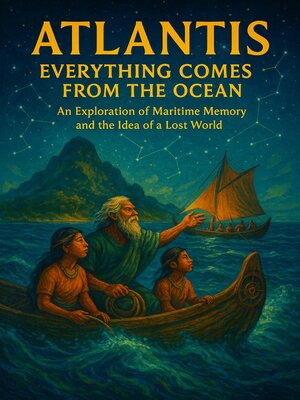
Sign up to save your library
With an OverDrive account, you can save your favorite libraries for at-a-glance information about availability. Find out more about OverDrive accounts.
Find this title in Libby, the library reading app by OverDrive.



Search for a digital library with this title
Title found at these libraries:
| Library Name | Distance |
|---|---|
| Loading... |
Atlantis: Everything Comes from the Ocean
An Exploration of Maritime Memory and the Idea of a Lost World
We are taught that civilization began when humans stopped moving—when they planted crops, built walls, and recorded laws in clay. But what if that story leaves something out?
What if a different kind of civilization came first—one that moved with the tide rather than resisting it? One that stored knowledge in memory, not in monuments? What if our deepest myths, especially those tied to the sea, are not just metaphors... but fragments of real, ancestral memory?
Atlantis: Everything Comes from the Ocean explores that possibility.
Blending anthropology, archaeology, mythology, and oral tradition, this book offers a new lens—one that treats myth not as fantasy, but as a form of encoded knowledge. It doesn't claim to prove a lost civilization existed. Instead, it asks: If one had existed—if a seafaring culture once flourished before the first cities—what traces would it leave behind?
It would not be found in stone or scroll, but in:
Drawing on thinkers like Mircea Eliade, Wade Davis, Patrick Nunn, Lynne Kelly, Giorgio de Santillana, and James C. Scott, this book proposes that we've underestimated the scientific function of story, ritual, and myth. Oral traditions were not just ways of making meaning. In many cases, they were technologies of memory—methods of storing complex data in a pre-literate world.
This is not an argument for fantasy or pseudoscience. It's a respectful, curious reexamination of our oldest stories—through the lens of cultures that never stopped living them.
As rising seas and shifting climates challenge our current ways of life, the flexible, portable knowledge systems of oceanic and oral cultures may prove more relevant than ever. Their insights, rhythms, and relationships to place still live on—in breath-held dives, starlit voyages, and songs sung beside the sea.
This is not a search for Atlantis as a lost city.
It's an exploration of what may be a lost way of thinking.
And maybe—not lost. Just waiting to be remembered.







